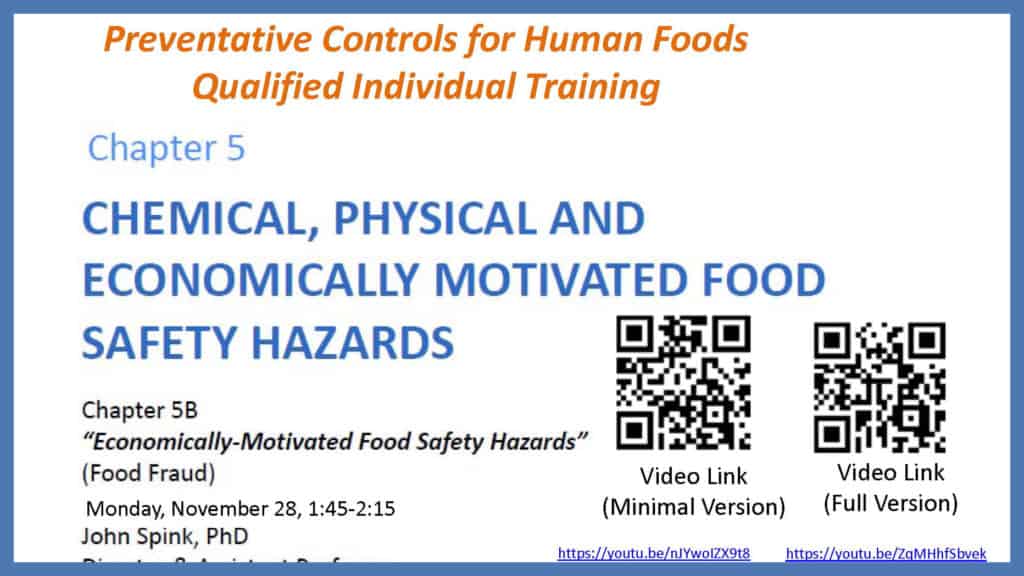As of last September, it was a FSMA compliance requirement to conduct a Food Fraud Vulnerability Assessment for all types of fraud for all your products. Attached is our public, free, open video presentation on Food Fraud from the FSMA Preventive Control for Human Food (PCHF) Qualified Individual Training (QI). This includes the PCHF content plus our additional comments.
We grant copyright approval for anyone to use this publicly available video for any training:
- Short-Version: only the PCHF slides (8-minutes): https://youtu.be/nJYwoIZX9t8
- Full-Version: the PCHF slides plus additional background information (18-minutes): https://youtu.be/ZqMHhfSbvek
Earlier  this week I presented on the FSMA QI training section related to Food Fraud. This is the third time I have presented in the QI training, and this session was co-hosted by the Michigan Department of Agriculture and Rural Development (MDARD) and by Meijer Corporation, who provided the venue (if you grew up in Michigan then you recognize “Sandy the Meijer Horse” in the picture).
this week I presented on the FSMA QI training section related to Food Fraud. This is the third time I have presented in the QI training, and this session was co-hosted by the Michigan Department of Agriculture and Rural Development (MDARD) and by Meijer Corporation, who provided the venue (if you grew up in Michigan then you recognize “Sandy the Meijer Horse” in the picture).
FSMA QI training materials use the phrases “economically motivated adulteration,” “economically motivated hazard,” and “economically motivated food safety hazard.” This is in support of the FSMA final rules that were reviewed in previous blog posts (preventive controls, produce rule, foreign supplier verification, accredited third party certification, and intentional adulteration/ Food Defense.)
To review the Food Fraud related FSMA requirements:
- All types of food fraud that could lead to a health hazard must be assessed. The FMSA-IA rule specifically mentions theft and stolen goods – so FSMA defines “stolen goods” as an “economically motivated” act.
- All hazards that are identified must have a prevention plan or control measure.
- The FSMA Preventive Controls Rule required this as of last September 2016
Regarding FSMA Intentional Adulteration (Food Defense):
- Food Fraud/EMA and Food Defense are not the same thing. While they are both “intentional” acts FDA separates them into two categories based on the motivation of the attacker.
- Food Defense is addressed specifically in the “Intentional Adulteration” rule.
- Food Fraud/EMA is addressed specifically and exclusively in the “Preventive Controls” rule – other final rules refer back to this rule.
- Food Defense compliance requires a separate vulnerability assessment.
- FDA further defines FSMA compliance for Food Defense to only “wide scale [human] public health harms” and not disgruntled employees, economically motivated adulteration, or malicious tampering.
We have stated and published that:
- ”It appears that current broad Food Fraud Vulnerability Assessment and Food Fraud Prevention Plan activities [e.g. GFSI] will lead to compliance with FSMA‐”
Question: Have you conducted a Food Fraud Vulnerability Assessment for all types of fraud and all of your products? If not, then you are not FSMA compliant.
Please feel free to use this training material as a starting point to understand your compliance requirements. For additional general resources see www.FoodFraudPrevention.com.
……………………………….
Reference:
Spink, John. (2016). Presenter: Section 5B Economically Motivated Hazards, Chapter 5 Chemical, Physical and Economically Motivated Food Safety Hazards, Qualified Individual Training, Preventative Controls for Human Foods (PCHF), FDA Certified Training, original presented at the Institute of Food Technologists (IFT) Annual Conference 2017, Chicago, July 14, 2016. [Note: we received copyright permission from the authors Food Safety Preventive Controls Alliance FSPCA to use their slides.], URL (short version): https://youtu.be/nJYwoIZX9t8, URL (long version): https://youtu.be/ZqMHhfSbvek

